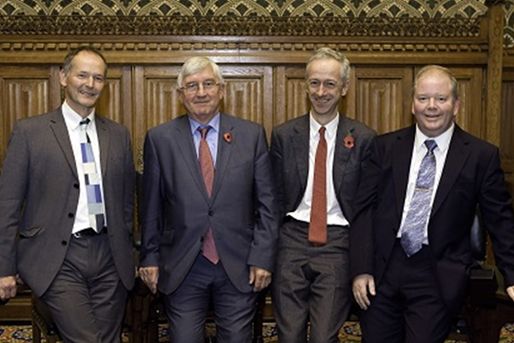The All Party Parliamentary Group on Archives and History
7th November 2012
'The All Party Parliamentary Group on Archives and History has invited the custodians of archives housed in our national libraries to share their views on the challenges and successes of the material in their care’

Photograph shows (left to right): Andrew Green of the National Library of Wales, Hywel Francis MP, Roly Keating of the British Library and Martyn Wade of the National Library of Scotland. Photograph: Simon O’Connor for the ARA.
The leaders of the UK’s three national libraries spoke of their challenges and successes to an invited audience in the House of Commons on 30 October.
Andrew Green of the National Library of Wales, Roly Keating of the British Library and Martyn Wade of the National Library of Scotland were the guests of the All Party Parliamentary Group on Archives and History. Hywel Francis MP, Chair, and eight members of the All Party Group were joined by an invited audience from the archives, library, history and education sectors to hear each speaker give a short presentation and then take questions.
‘The National Library of Scotland is more than a library’ said Martyn Wade. Each speaker echoed that and touched on the sheer breadth and depth of the collections in their care and their commitment to the widest possible audience and the easiest possible access. Digitisation offered many solutions but also ‘challenges at every stage’ said Andrew Green. The National Library of Wales had chosen to fund its own digitisation projects; the British Library had chosen to work with business partners to reduce the cost to the public purse. ‘Digital reduces barriers’ said Roly Keating, who had been in post only six weeks and was previously Head of Archive Content at the BBC, an institution committed to ‘the giving of access’. The progress on digital deposit law (‘nearly there’) brought the reality of ‘a distributed national collection’ much closer, as well as the certainty of ‘a new generation of users’.
‘It’s all about connectivity’. All the national libraries were determined to reach out – locally, nationally and internationally. And technical infrastructure improvements promised ‘a full system of connectivity’. Exciting futures may rest on ‘a good bit of software’. But if future generations visit a national library out of ‘choice not need’, what will bring them? Martyn Wade reminded the audience of the power of the original: thousands of visitors queuing to see the handwriting of Mary Queen of Scots, though the digital image was widely available.
Given that future archives rested on ‘born digital’ material, had we lost forever the exploration of a creative person’s thinking process? Annotations, re-drafting on paper or within a printed book had given much to researchers. Martyn Wade counselled against nostalgia: ‘print and paper weren’t perfect’ and those charged with keeping material for the future must do their best whatever is produced, whatever is kept. Is Twitter the new vehicle for ‘thoughts in progress’?
The fight to ‘keep our heritage here in the UK’ was not new: ‘archives have a price’ said Roly Keating. But there was some optimism that schemes such as the Cultural Gifts Scheme to encourage the deposit or sale of important archives within the UK would have an impact.
Collection care in a time of reduced resources was a shared concern.
‘What is a nation? And what is a national collection?’ There were few boundaries, between the UK nations and between, for example, those who accessed their Scottish heritage from all over the world. Within the nations, there were also few boundaries between those who cared for other cultural objects; a ‘web’ of cultural institutions were working well together.
The audience’s questions were wide-ranging. Lord Boswell welcomed ‘a professional appetite among the national libraries to work together’ (the speakers had referred to a ‘template for working together’ in a ‘broad direction, not a critical path’). He and Lord Howarth both were keen to know what legislators might do to ensure the right outcome of ‘common good versus public policy’. There was shared dismay at the vulnerability of too many archive collections in difficult times.
In 2011, the All Party Group on Archives and History had held a similar session with the leaders of the UK national archives. This ‘sister’ meet had complemented and added to that earlier ‘evidence’ session. Dr Francis was committed to continued dialogue between the All Party Group and those with responsibilities for the nation’s archives; the All Party Group stood ready to support, help and be a conduit to fellow parliamentarians.
Hywel Francis thanked the speakers and the audience for their excellent contributions and the Archives and Records Association (UK & Ireland) for its administration of the All Party Group.
